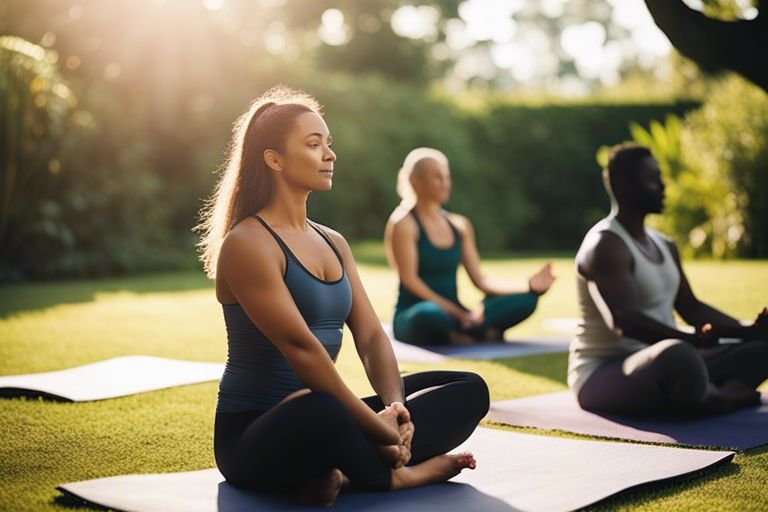As you navigate the complexities of modern life, you may find yourself struggling to recall important details or feeling mentally foggy. The good news is that you have the power to improve your cognitive function and boost your brain health through the ancient practice of yoga. By incorporating specific yoga exercises into your daily routine, you can enhance your memory, increase focus, and even reduce the risk of neurodegenerative diseases. In this article, we’ll explore five yoga exercises that will help you unlock the full potential of your mind and cultivate a sharper, more resilient brain.
Key Takeaways:
- Improved Blood Flow: Practicing yoga exercises such as Downward-Facing Dog, Tree Pose, and Seated Forward Fold can increase blood flow to the brain, which is important for memory enhancement and overall brain health.
- Reduced Stress and Anxiety: Yoga exercises like Child’s Pose and Legs Up The Wall Pose can help reduce stress and anxiety levels, which are known to negatively impact memory and cognitive function. By reducing stress, yoga can help improve focus, concentration, and overall brain function.
- Neuroplasticity and Brain Adaptation: Regular yoga practice can stimulate neuroplasticity, the brain’s ability to adapt and change, which is important for learning and memory. By challenging the brain with new movements and postures, yoga can help build new neural connections and strengthen existing ones, leading to improved cognitive function.
The Science Behind Yoga and Brain Health
A growing body of research has revealed the profound impact of yoga on brain health and cognitive function. By incorporating yoga into your daily routine, you can experience significant improvements in memory, concentration, and overall mental well-being.
The Connection Between Yoga and Neuroplasticity
Yielding to the demands of modern life, your brain is constantly adapting and rewiring itself. This process, known as neuroplasticity, allows your brain to reorganize and compensate for changes in your environment and behavior. Yoga has been shown to promote neuroplasticity by stimulating the growth of new neurons and forming new connections between them.
How Yoga Affects Cognitive Function
To tap into the full potential of your brain, yoga offers a unique set of tools and techniques. By combining physical postures, breathing exercises, and meditation, yoga has been shown to improve attention, memory, and processing speed.
For instance, studies have found that regular yoga practice can increase grey matter in areas of the brain associated with attention, emotion regulation, and memory. This means that you can expect improved focus, reduced stress, and enhanced mental clarity as you continue to practice yoga. Additionally, yoga has been shown to reduce inflammation and oxidative stress, both of which are major contributors to cognitive decline.

Top 5 Yoga Exercises for Memory Enhancement
Now that we’ve explored the benefits of yoga for brain health, let’s probe the top 5 yoga exercises that can help improve your memory and cognitive function.
Tree Pose (Vrksasana) for Improved Focus
Yoga’s Tree Pose is an excellent exercise for improving your focus and concentration. By standing on one leg, you challenge your balance and engage your core, which helps to quiet the mind and reduce distractions. As you practice Tree Pose, you’ll find that your ability to focus on a single point improves, allowing you to stay present and aware.
Downward-Facing Dog (Adho Mukha Svanasana) for Enhanced Cognitive Function
Tree-like in its ability to ground and calm, Downward-Facing Dog is a powerful pose for enhancing cognitive function. By inverting your body and stretching your spine, you increase blood flow to the brain, which can help to improve memory and concentration.
For instance, regular practice of Downward-Facing Dog has been shown to increase grey matter in the brain, leading to improved cognitive function and a reduced risk of age-related cognitive decline.
Seated Forward Fold (Paschimottanasana) for Reduced Stress
Paschimottanasana, or Seated Forward Fold, is a gentle yet powerful pose for reducing stress and anxiety. By folding forward and stretching your entire back side, you release tension and calm your nervous system, creating a sense of relaxation and tranquility.
Memory and cognitive function are closely linked to stress levels, so by reducing stress through Seated Forward Fold, you can improve your overall brain health and memory.
Eagle Pose (Garudasana) for Boosted Memory
On the mat, Eagle Pose is a challenging yet rewarding exercise for boosting memory and cognitive function. By wrapping your legs around each other and engaging your core, you stimulate blood flow to the brain and challenge your focus and concentration.
Garudasana has been shown to increase the production of neurotransmitters, such as dopamine and serotonin, which play a crucial role in memory formation and recall.
Child’s Pose (Balasana) for Relaxation and Clarity
Enhancement of memory and cognitive function requires a clear and relaxed mind, which is exactly what Child’s Pose provides. By surrendering into this restorative pose, you calm your nervous system and quiet the mind, allowing for greater clarity and focus.
DownwardFacing Dog may stimulate blood flow to the brain, but Child’s Pose allows your brain to rest and recharge, leading to improved memory and cognitive function over time.
10 Energizing Drinks to Boost Stamina and Speed Up Muscle Recovery

Tips for Incorporating Yoga into Your Daily Routine
Unlike other forms of exercise, yoga is a holistic practice that can be adapted to fit your lifestyle and schedule. To reap the benefits of yoga for memory enhancement and brain health, it’s necessary to make it a consistent part of your daily routine. Here are some tips to get you started:
- Start small and commit to a regular practice, even if it’s just 10 minutes a day.
- Create a dedicated yoga space in your home that inspires relaxation and focus.
- Find a yoga community or join online classes to stay motivated and learn from others.
- Explore different yoga styles and sequences to find what works best for you, such as the 5 Super Brain Yoga Exercises to Boost Your Gray Matter – a sequence specifically designed to improve cognitive function.
Perceiving yoga as a journey rather than a destination will help you stay committed and enjoy the process of transformation.
Starting Small: 10-Minute Yoga Sessions for Busy Days
Yoga is not about dedicating hours to practice; it’s about consistency and intention. Even on busy days, you can squeeze in a 10-minute yoga session to calm your mind and energize your body. Try incorporating simple poses like child’s pose, downward-facing dog, and seated forward bend into your daily routine.
Creating a Yoga Sanctuary: Setting Up Your Home Practice Space
Home is where the heart is, and creating a yoga sanctuary in your home can help you establish a consistent practice. Designate a quiet, clutter-free space with a yoga mat, blocks, and straps. Add some calming elements like candles, plants, or soothing colors to create an ambiance that inspires relaxation.
Daily yoga practice can become a sacred ritual when you have a dedicated space that feels peaceful and inviting. As you step onto your mat, you’ll feel more centered and focused, ready to commence on your yoga journey.
Finding a Yoga Community: Joining Classes and Workshops
Creating connections with like-minded individuals can enhance your yoga practice and provide motivation. Look for local yoga studios, gyms, or community centers that offer classes and workshops. You can also explore online platforms and apps that offer virtual classes and tutorials.
Days turn into weeks, and weeks turn into months when you’re practicing yoga with a community that supports and inspires you. You’ll learn new techniques, gain confidence, and develop a deeper understanding of the practice, ultimately leading to a more profound impact on your memory and brain health.
Summing up
Hence, as you launch on this transformative journey of yoga for memory enhancement and brain health, remember that these 5 exercises are merely a gateway to unlocking your full potential. By incorporating them into your daily routine, you’ll begin to notice profound changes in your mental clarity, focus, and overall well-being. As you cultivate a deeper connection with your body and mind, you’ll unlock the secrets to a sharper, more resilient brain, and unlock a life of purpose, creativity, and fulfillment.
FAQ
Q: What are the benefits of yoga for memory enhancement and brain health?
A: Yoga has been shown to have numerous benefits for memory enhancement and brain health. Regular yoga practice can improve concentration, attention, and memory by increasing blood flow to the brain and promoting the growth of new neurons. Additionally, yoga has been found to reduce stress and anxiety, which can negatively impact memory and cognitive function. Furthermore, yoga has been linked to increased gray matter in the brain, which is associated with improved cognitive function and a lower risk of age-related cognitive decline.
Q: Can yoga really improve memory, or is it just a myth?
A: While it may seem like a myth, the benefits of yoga for memory enhancement are backed by science. Studies have consistently shown that yoga practice can lead to improved memory and cognitive function. For example, a 2012 study published in the Journal of Alzheimer’s Disease found that yoga increased verbal memory and improved cognitive function in individuals with mild cognitive impairment. Another study published in 2016 in the journal Psychosomatic Medicine found that yoga improved memory and reduced symptoms of depression in individuals with chronic stress. These findings suggest that yoga can indeed have a positive impact on memory and brain health.
Q: Do I need to be flexible or have prior yoga experience to practice yoga for memory enhancement?
A: Absolutely not! Yoga is accessible to individuals of all ages and abilities. You don’t need to be flexible or have prior yoga experience to practice yoga for memory enhancement. In fact, many yoga styles, such as Hatha, Yin, and Restorative yoga, are gentle and slow-paced, making them perfect for beginners. Additionally, many yoga exercises for memory enhancement focus on breathing techniques, meditation, and gentle movements, which can be adapted to suit individual needs and abilities. You can start with simple exercises and gradually build up your practice as you become more comfortable. The most important thing is to find a style and pace that works for you and to commit to regular practice.
